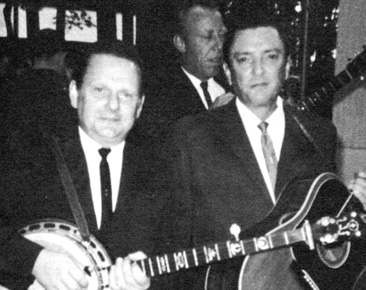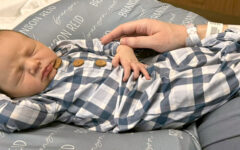
On March 11, 1966, the Stanley Brothers made their one and only appearance in England, at the Royal Albert Hall, London.
The Stanley Brothers – Carter, the lead singer, guitarist and the elder of the two, and banjo-playing Ralph – were the headline act on the American Folk & Country Music tour, a package show, that played 18 dates, mostly in Germany. In addition to the appearances in Germany and England, there were shows in Sweden, Denmark and Switzerland. It was an intense tour with just one rest day.
The tour brochure described Carter Stanley’s music as “highly emotional, yet characterised by its cool and restrained delivery. The total effect is of a personal intensity which communicates directly.”
Of Ralph Stanley it said his “style of banjo playing can be characterised as driving, jazzy, and traditional at the same time. It is different from other bluegrass banjo styles, in that it continues as a forceful part of the music while playing back-up, as well as lead. His high singing retains many of the styles heard in the Old Baptist singing as well as in the ancient Ballad music. Its ready and intense quality is uncommon in the majority of modern country styles, but is the quality that is the essence of mountain music.”
The Clinch Mountain Boys at the time were George Shuffler (referred to as the third Stanley Brother, due to the stalwart service that he gave to Carter and Ralph), playing guitar and singing baritone and bass on a rendition of Jordan, James ‘Chick’ Stripling (string bass) and Don Milller (fiddle).
At the time it was noted that the brothers were working out of Live Oak, Florida.
Ian Kelsall, John Field and Paul Brewer all attended the London concert and they share their memories of the event.
The drama for Ivan Kelsall began over 200 miles north of London ……..
“I’ll never forget it. I travelled down on the slowest coach ever. I set off from Manchester at 10.00 a.m. and the coach arrived in London at around 6:15 p.m. I didn’t know where the hell I was, but fortunately, there was a police officer standing just outside the bus depot and he told me where and which bus to get to the Royal Albert Hall. I met up with a friend of mine from Finchley, Dougie Derby, a fantastic Chet Atkins guitar stylist. I was supposed to be staying overnight at Dougie’s parent’s home, but as Dougie had to return to work in Portsmouth, I ended up traveling back to Manchester overnight, straight after the concert. I was like ghost when I got home, over 24 hours without sleep.
Anyway, the concert – the acts – if I remember correctly, were The Stanley Brothers / The New Lost City Ramblers / a Cajun band who’s name escapes me, and an old gal named Cousin Emmy.
The Stanley Brothers came on stage and kicked off with an instrumental version of Wildwood Flower (I’m 95% sure) which surprised me as I only knew it as a song. I do remember George Shuffler swapping bass and guitar roles with the bass player and playing some incredible ‘slap string bass’.
I don’t really remember many details about the other bands other than that Cousin Emmy was a riot. She really enjoyed herself and at one point played a tune on an inflated rubber glove!
I’m pretty sure that both Bill Clifton and our own Pete Stanley were in the audience.
When Ralph Stanley came over to play the Edale Bluegrass festival many years ago, while he was on stage, he asked if there was anybody in the audience who’d been at the Royal Albert Hall – me and one other person put our hands up. I spoke with Ralph after he came off stage and we had a nice long chat about it.
I was very fortunate to have been there to see both Ralph and Carter, because as you’ll know, Carter passed away later that year.
Of course, in June we had Bill Monroe over here, that was when my own band opened for them at the MSG (Manchester Sports Guild) here in Manchester – what a terrific year!”
John Field’s memories are less clear …
“The Stanley’s were a knockout though and I recall being thrilled that they sounded exactly as they did on the Melodisc LP Mountain Song Favourites, which I’d bought back in 1961….. Pretty sure that they performed a few of the numbers on that LP too. The band comprised Carter and Ralph and ‘Chick’ Stripling, James Miller and George Shuffler.”
He went on to say …..
“Regards the Stanley Brothers’ sets….I cannot really remember too many details. It’s 50 years ago! Pretty sure they played Rank Stranger and Little Maggie amongst many other numbers. I do recall that their overall sound was just like their recordings. It made the hair stand up on one’s neck….. Although Carter did not have long to live at the time, his singing seemed undiminished. George Shuffler played a few guitar breaks. Ralph was playing that high-end archtop Mastertone.”
Paul Brewer’s current band the New Essex Bluegrass Band bears a distinct Stanley Brothers’ influence ….
“I was just seventeen and had known about them for about three years, having been introduced to bluegrass via the folk clubs in my home town of Portsmouth. I had even been playing in a small trio performing their material and others learned from the recordings of the New Lost City Ramblers. In March 1966 I had just arrived in London to start full-time work and so was perfectly placed to see the show that night.
Unfortunately, I do not have any photographs from that evening, nor any other souvenirs, but I certainly remember the excitement among the crowd waiting outside for the doors to open. For many like myself it must have been the very first time they were going to see a live performance from a genuine American bluegrass band.
As for the show itself I must admit that I was not exactly over-impressed. I cannot now remember Roscoe Holcomb at all, or Minnie Pearl < (sic.) Cousin Emmy >. I do remember the Cajun band but I was quite unfamiliar with the style and thought it no more than a novelty. I had been very keen to see the New Lost City Ramblers and was not disappointed. I remember Tracy joining The Stanley Brothers on bass, but Carter was uninspiring. We did not know about his health problems at the time, but he certainly came across to me a someone whose best performances were behind him. At seventeen I was all too ready to believe that those above the age of forty were likely to be in decline. I remember thinking that the two brothers must be really bored after having sung the same material for over twenty years.
In his book Lonesome Melodies David Johnson writes, ‘Some of the musicians recognized that Carter was in the advanced stage of alcoholism, but audiences would not have known.’ They might not have known the cause but the audience that night must have thought that he was no longer at his best.
I wish I could have enjoyed that performance more. I have become a much bigger fan of Carter and Ralph since my teens and I am so sorry that Carter left us that early, less than a year after that night in London.
Carter Stanley passed away on December 1, 1966, not quite nine months after this performance.
Additionally, there were printed reviews – one in Country Music Special (Issue No. 3), the commentator recognising the contributions of George Shuffler and being tremendously satisfied with the inclusion of the closing number Searching for a Soldier’s Grave, ending “a really outstanding show”; and the Country & Western Express (undated) – both British magazines – and in the March 20, 1966, edition of the Baltimore Sun.
 In October 2007 Bear Family Records released a two-CD set, named American Folk & Country Music Festival (BCD 16849). Recorded in Bremen, Germany, on March 17, it features the Stanley Brothers playing two songs and an instrumental in their first set/CD and nine of their favorites on the second CD, including a medley – Roll in My Sweet Baby’s Arms, Long Journey Home and Katie Cline. Additionally, Roscoe Holcomb joined the brothers for two out of the three-piece finale.
In October 2007 Bear Family Records released a two-CD set, named American Folk & Country Music Festival (BCD 16849). Recorded in Bremen, Germany, on March 17, it features the Stanley Brothers playing two songs and an instrumental in their first set/CD and nine of their favorites on the second CD, including a medley – Roll in My Sweet Baby’s Arms, Long Journey Home and Katie Cline. Additionally, Roscoe Holcomb joined the brothers for two out of the three-piece finale.
It is packaged with a 76-page hard-backed book with a large selection of photographs. As well as pictures it includes stories about the show at the Royal Albert Hall.
While there wasn’t any known recording of the London concert, I expect that the set listing was very similar for each show.
Bluegrass Today is indebted to Stanley Brothers’ expert Gary B. Reid for sharing information, thoughts, various documents and pictures thus enabling the writing of this article.








